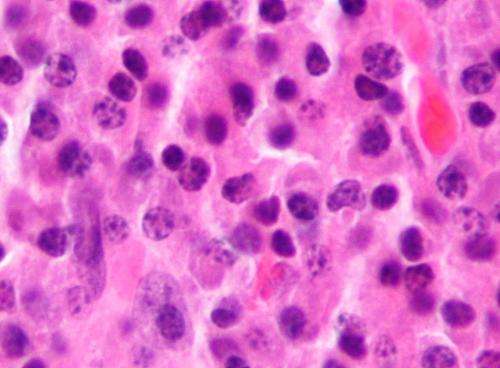This article has been reviewed according to Science X's editorial process and policies. Editors have highlighted the following attributes while ensuring the content's credibility:
fact-checked
peer-reviewed publication
trusted source
proofread
Researchers develop 'potent and specific' compounds to curb cancer growth

Proteasomes are protein-degrading complexes that are important for cancer cell survival. Proteasome inhibitors are commonly used to treat diseases such as multiple myeloma and mantle cell lymphoma. Proteasomes have three different active sites but all current FDA-approved inhibitors preferentially target only one active site, known as β5. Despite their success, these drugs have significant limitations including severe side effects and drug resistance.
Investigators from Mass General Brigham developed new therapeutics that strongly and specifically inhibit another active site for proteasomes, known as β2. Proteasome inhibitors have typically been identified by screening tens of thousands of compounds.
In contrast, these new β2 inhibitors were rationally designed based on earlier work by the same research group in which they identified the structure of PI31, a naturally occurring proteasome inhibitor. The paper is published in the journal Proceedings of the National Academy of Sciences.
In the new study, the researchers synthesized a suite of small molecules that could inhibit the β2 proteasome site without blocking the other active sites.
In preclinical models, one of their compounds, ARFL-Boro, effectively inhibited growth of multiple myeloma cells as a standalone agent, as well as in combination with an existing β5 inhibitor drug. The authors suggest that combining the newly identified drug with existing drugs could be useful for reducing therapeutic resistance and possibly lowering side effects.
"We used this approach to develop a new class of proteasome inhibitors and found that they were strongly active against multiple myeloma," said corresponding author John Hanna, MD, Ph.D., of the Department of Pathology at Brigham and Women's Hospital and Mass General Brigham.
"Our findings establish β2 as a therapeutic target for multiple myeloma for the first time, which opens up promising new opportunities for drug development."
More information: Benjamin Velez et al, Rational design of proteasome inhibitors based on the structure of the endogenous inhibitor PI31/Fub1, Proceedings of the National Academy of Sciences (2023). DOI: 10.1073/pnas.2308417120

















